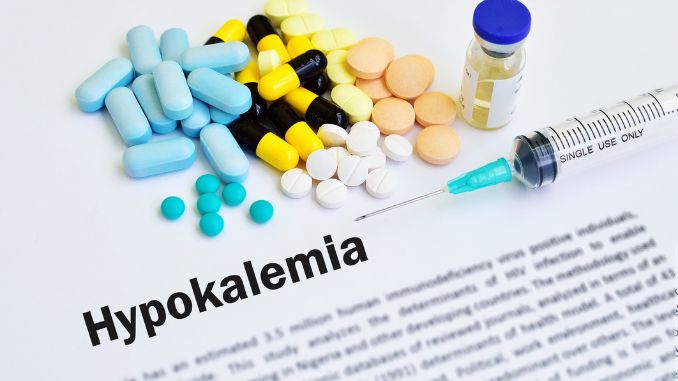Hypokalemia Unveiled: Exploring The Hidden Dangers Of Low Potassium Levels

Last updated on April 4th, 2025 at 06:14 pm
Hypokalemia is a condition marked by low blood potassium levels, often coming from not enough potassium intake, urinary potassium excretion, or chronic hypokalemia. It can also show mild hypokalemia with subtle symptoms like muscle weakness or progress to severe hypokalemia, causing severe muscle weakness and deadly medical issues.
The normal potassium range in the blood is usually between 3.5 to 5.0 milliequivalents per liter (mEq/L). Hypokalemia occurs when the blood potassium level drops below 3.5 mEq/L. When potassium levels drop below the normal range, it can badly affect the body. Moreover, if you're experiencing symptoms of hypokalemia, it's important to be careful and have your blood potassium levels tested.
Furthermore, read on as we uncover the hidden dangers of low potassium and provide you with valuable knowledge to keep yourself healthy.

Causes Of Hypokalemia
Inadequate dietary intake, medications, and medical conditions are indeed some of the most common causes of hypokalemia.
A. Inadequate dietary intake
Inadequate dietary intake is one of the causes of hypokalemia because the body relies on getting potassium from the foods we consume. Moreover, if the diet continually lacks foods rich in potassium or does not provide enough amount of this important mineral, it can lead to low potassium in the body.
Here are some reasons why not enough dietary intake can cause hypokalemia:
1. Insufficient Potassium Consumption
Potassium-rich foods include fruits (such as bananas, apples, oranges, and avocados), vegetables (such as spinach, potatoes, and tomatoes), legumes, dairy products, and fish. Also, if one's diet lacks these potassium sources, their daily intake may not meet the suggested levels.
2. Imbalanced Or Restrictive Diets
Certain dietary patterns or limited diets may certainly limit the variety or number of potassium-rich foods. For example, diets that overly emphasize processed foods, fast foods, or foods high in sodium and low in fresh produce can result in inadequate potassium intake.
3. Malnutrition Or Poor Nutrient Absorption
Malnutrition or conditions harming nutrients, such as certain gastrointestinal disorders like Crohn's disease and celiac disease, or chronic diarrhea, can lead to a lack of nutrients, including potassium. Moreover, these conditions prevent the body from taking in potassium properly from the diet, leading to low potassium levels.
4. Excessive Alcohol Consumption
Alcohol can certainly interfere with the body's ability to maintain proper potassium levels. Furthermore, chronic too much alcohol drinking can lead to reduced potassium intake from dietary sources, added urinary removal of potassium, and problems with absorption in the gastrointestinal tract.
5. Elderly Individuals
Older adults may be at higher risk of not having enough dietary potassium intake due to various factors. These certainly include reduced interest in eating, limited access to fresh foods, altered taste understanding, a reduced diet linked with certain health conditions, and the use of multiple medications that can affect potassium levels.
B. Medications And Medical Conditions That Cause Potassium Loss.
Here are some medical conditions that can add to potassium loss:
1. Gastrointestinal Disorders
Certain gastrointestinal disorders can cause too much potassium loss through nausea and low bowel movement. Conditions like painful bowel disease (Crohn’s disease, ulcerative colitis), chronic low bowel, or surgical procedures including the digestive tract can lead to hypokalemia due to more potassium elimination.
2. Hyperaldosteronism
This refers to a condition where the adrenal glands produce too many amounts of the hormone aldosterone. Moreover, aldosterone plays a role in regulating sodium and potassium levels in the body. When aldosterone levels are raised, it can cause added potassium excretion, leading to hypokalemia.
3. Cushing’s Syndrome
A hormonal disorder marked by too much production of cortisol (a stress hormone) by the adrenal glands. Also, raised cortisol levels can interfere with potassium balance and increase urinary potassium excretion, contributing to hypokalemia.
4. Diuretic Use
Diuretics, commonly advised to manage conditions like hypertension or edema, increase urine production and promote fluid excretion. Some diuretics, such as loop diuretics (e.g., furosemide) and thiazide diuretics (e.g., hydrochlorothiazide), can cause the rise of potassium excretion, more chances of leading to hypokalemia if not enough watched.
5. Laxative Abuse
Excessive or chronic use of laxatives, particularly those with a stimulant effect, can lead to potassium loss. Laxatives can certainly increase bowel movements and result in potassium decline through too much fecal excretion.
6. Metabolic Acidosis
Metabolic acidosis is a condition characterized by an excess of acid in the body, leading to an imbalance in electrolytes, including potassium. Moreover, acidosis can cause potassium to shift from the intracellular to the extracellular space, resulting in low serum potassium levels.
7. Hyperemesis Gravidarum
Hyperemesis gravidarum is a severe form of nausea and nausea that can occur during pregnancy. Also, prolonged and severe nausea can lead to dehydration and electrolyte imbalances, including potassium loss, likely causing hypokalemia.
Signs And Symptoms Of Hypokalemia
Symptoms of hypokalemia can vary depending on the gravity of the condition, but they may include the following:
- Muscle weakness and cramps
- Fatigue and lethargy
- Irregular heart rhythm and palpitations
- Digestive disturbances
- Mood changes and psychological symptoms
Moreover, if you suspect you have hypokalemia or are experiencing symptoms, it’s best to consult a healthcare professional for accurate diagnosis and appropriate treatment.
Complications And Hidden Dangers
It is important to determine and treat hypokalemia because severe or prolonged cases can lead to serious complications, including:
- Cardiac complications and growing risk of arrhythmias
- Impact on muscular and nervous system function
- Renal complications and impaired kidney function
- Association with metabolic disorders and hypertension
Diagnosis And Medical Evaluation
Diagnosis of hypokalemia involves the following:
- Physical examination and medical history
- Blood tests and potassium levels
- Electrocardiogram (ECG) to assess heart function.
Treatment And Management
Treatment certainly depends on the current cause and severity of the condition. It may involve rising potassium intake through diet or supplements, solving the present medical condition, adjusting medications, or in severe cases, intravenous potassium supplementation in a hospital setting.
Strategies That Healthcare Professionals May Use To Manage Hypokalemia:
1. Potassium Replacement Therapy
The primary treatment for hypokalemia is to increase potassium levels in the body. This can be achieved by oral potassium supplements, potassium-rich foods, or intravenous potassium administration in severe cases.
2. Addressing Current Medical Conditions
Addressing the current medical condition that causes hypokalemia can help prevent potassium loss and restore normal potassium levels. For example, treating kidney disease or stopping medications that cause potassium loss can help manage hypokalemia.
3. Adjusting Medications
Healthcare professionals may adjust medications that add to potassium loss or cause hypokalemia. For example, they may prescribe a different diuretic or adjust the dose to reduce potassium loss.
4. Monitoring Electrolyte Levels
Monitoring electrolyte levels, including potassium, through regular blood tests can help detect hypokalemia early and ensure proper management.
5. Dietary Changes
Increasing potassium intake through diet can help manage hypokalemia, especially in mild cases. Foods rich in potassium include bananas, oranges, avocados, potatoes, spinach, yogurt, and fish.
6. Managing Current Conditions
Managing present conditions adding to hypokalemia, such as gastrointestinal disorders or hyperaldosteronism, can help prevent further potassium loss and restore normal potassium levels.
7. Intravenous Fluids
Intravenous fluids that contain potassium may be administered in severe cases of hypokalemia to rapidly restore potassium levels.
Maintaining potassium homeostasis is crucial for proper bodily functions, as serum potassium levels play a vital role in various physiological processes. In cases of low serum potassium concentration, potassium supplements may be prescribed to restore potassium levels. It is important to monitor potassium levels closely, especially for individuals on potassium-sparing diuretics or those at risk of excess potassium. Proper management of hypokalemia is crucial for maintaining overall health and preventing adverse effects on muscle function, blood pressure, and other bodily functions.
Prevention And Lifestyle Considerations
Prevention and lifestyle considerations play an important role in managing and preventing hypokalemia (low potassium levels). Here are some key plans:
1. Balanced Diet
Consuming a well-balanced diet that includes potassium-rich foods can help prevent hypokalemia. Incorporate potassium-rich foods such as bananas, oranges, avocados, potatoes, spinach, yogurt, and fish into your meals. Aim for a diet that includes a variety of fruits, vegetables, whole grains, lean proteins, and dairy products to ensure adequate potassium intake.
2. Moderation In Alcohol Consumption
Excessive alcohol drinking can add to potassium loss. It is important to consume alcohol in control or seek advice to avoid too much potassium lowered.
-
Avoiding Laxative Abuse
Chronic or too much use of laxatives can lead to potassium loss. It is important to use laxatives as directed and only under medical supervision.
-
Proper Hydration
Maintaining proper hydration is crucial for overall health, including potassium balance. Drink enough amount of water daily, especially during periods of added physical activity, hot weather, or illness.
-
Medication Management
If you are taking medications that can cause potassium loss, such as diuretics, it is important to closely follow your healthcare professional's instructions. They may adjust the dosage or prescribe additional potassium supplementation to prevent hypokalemia.
-
Regular Medical Check-ups
Regular medical check-ups and monitoring of electrolyte levels, including potassium, are important, especially if you have current medical conditions or take medications that can affect potassium balance. This allows for early notice of any imbalances and timely action.
-
Speak to a Healthcare Professional
If you have a history of hypokalemia or if you are at risk due to medical conditions or medications, consult with a healthcare professional. They can provide personalized advice on preventing and handling hypokalemia based on your specific situation.
Remember, prevention and lifestyle considerations are important in managing hypokalemia, but it is crucial to work closely with a healthcare professional for proper judgment, diagnosis, and treatment. They can provide one's recommendations based on your specific needs and circumstances.
Conclusion
Hypokalemia presents significant dangers and hints for individuals' health and well-being. Recognizing and solving low potassium levels is of utmost importance to prevent potential problems. By understanding the risks linked with hypokalemia, healthcare professionals can execute appropriate actions to restore potassium levels and reduce the adverse effects on various bodily functions.
Furthermore, further research and education on hypokalemia are highly encouraged. Increased knowledge and understanding of hypokalemia's causes, mechanisms, and treatment options can improve correct diagnostic and more effective management plans. This research can also shed light on potential preventive measures and the development of new therapies to address the present causes of hypokalemia.
By knowing the importance of being aware and giving solutions to hypokalemia and raising ongoing research and education, we can strive for better patient results, early action, and, ultimately, a healthier population.
Now, take dietary supplements that can balance your diet. Don’t waste your time and money – get our guide to learn how to use supplements wisely!
Rick Kaselj MS, is a leading kinesiologist and injury specialist as well as co-creator of the best-selling Unlock Your Hip Flexors program. Rick creates exercise programs that help people heal injuries and eliminate pain, so they can go back to living a full, active, healthy life.







